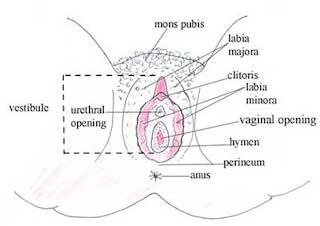External female genitalia
Look at Figure 3.2 carefully. All the structures which are visible externally, surrounding the urethral and vaginal openings, including the mons pubis, labia majora, labia minora, vestibule and perineum, make the external female genitalia. Sometimes these structures are collectively named the vulva.

Structures in the external female genitalia have a nerve supply, which can respond to different sensory stimuli (touch, pain, pressure and temperature). This makes these structures sensitive and active to sexual arousal during touch, especially by the male partner. Following this, the sexual act between the male and female facilitates the ejaculation of male sex cells into the female internal reproductive organs, initiating the process of fertilisation, pregnancy, labour and delivery.
Notice in Figure 3.2 that the urethral opening, the vaginal opening and the anus are all close together in the vulva. What do you think is the clinical importance of this close relationship for the pregnant woman?
Advising the pregnant woman to keep this area clean through good personal hygiene is very important. Infections of the bladder and vagina are common in pregnancy, and if bacteria get into her uterus, she could lose the baby.
Now we will look at each of the structures in Figure 3.2, beginning with those on the outer edges of the diagram, and ending with those in the centre.